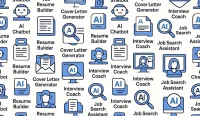Successful recruiters look beyond the established talent, casting their net wider to attract a range of talent.
However, in order to attract diverse interest, recruiters need to know what their target audience are looking for.
And Gen Z has some specific ideas in terms of candidate experience.
As reported in the IT Salary Guide by Motion Recruitment, despite some uncertainty over the past years, demand for tech talent is set to rise again this year.
The Bureau of Labor Statistics shows very little change in unemployment rates over the past year, with the tech industry having considerably lower rates of unemployment than the national average.
What’s more, the tech industry is growing at a rapid rate; according to the Business Research Company, the IT market will grow at a compound annual growth rate of over six percent in 2024 alone.
Increased growth means increased demand, and who better to fill the ever-evolving skills gaps than Gen Z: our first true digital natives.
So, what could boost the candidate experience for this youngest generation to enter the job market?
Make it personal
It may seem ironic coming from a generation that is known for interacting with screens more than humans, but maybe that is why a more tailored experience resonates more with Gen Z.
Or maybe it is because all humans like a personal experience when going through a potentially life-changing process.
While automated applications involving question banks and tick boxes may help to streamline shortlisting, removing the tailored element of applications means two things: applicants can apply for jobs in much higher volumes; and they are less likely to pass through shortlisting.
Rather than going for quantity, recruiters (and therefore applicants) need to look at quality: a recruiter is better off having fewer, high-quality applications, and candidates are at an advantage if they spend time applying for a handful of jobs for which they have demonstrable skills and experience, or passion and willingness to learn.
The era of quick-apply can lead to poor quality applications and disengaged candidates, as their attempts remain unsuccessful.
The challenge is to get the right balance of attracting candidates who are renowned for being highly connected to their screen while providing them with an appropriately personal experience to engage them and ensure that they are the right fit for the role before applying.
Clarify expectations
Gen Z is set to become the best-educated and most diverse workforce, but this does not come without challenges. When combining higher levels of pre-employment education with the quick-win culture that Gen Z is growing up in, it is understandable that many candidates want it all – and fast.
By managing expectations and clarify pathways and key touchpoints within their journey, potential employers can make sure that they not only pick the right candidate, but that their candidate, once in post, doesn’t become despondent at their perceived slow rate of progression.
Organizations can work to emphasize that, for individuals entering the workforce, entry level jobs are the norm, but that as skills are developed to match the knowledge, new opportunities will arise.
For recruiters seeing a high volume of applicants that lack the experience, signposting them to alternative opportunities can help candidates to realign their expectations in terms of role seniority, while helping recruiters to invest in talent with significant development potential.
Need Career Advice? Get employment skills advice at all levels of your career
Building relationships
The formality of 20th Century relationships is fast fading, as people across org charts increasingly see – and treat- each other as equals.
Mutual respect is something that the boomer and Gen X believe needs to be earned; Gens Y and (even more so) Z expect to be respected from the outset.
This belief, compounded by social media interactions, has resulted in some push and pull in the workplace.
While it is important for employers to recognize this need in candidates for mutual connection, it is vital that organizations know what they need to do in order to help candidates to develop in such a way that they can successfully navigate the workplace.
For many Gen Z candidates, this means careful education of the rules of professionalism, and the different lines between office and social deportment and, for example, writing a social media post or instant message versus writing an email to a client or colleague.
When it comes to working with digital natives, it can be expected that many are digitally fluent, but may not be as well versed in professional customs and languages.
By setting those boundaries early, employees can prevent candidate disengagement (or embarrassment) and ensure that company standards are adhered to from the outset.
Spread the word
In this multimedia age, all people are used to deploying different platforms to find different pieces of information, and Gen Z is not the exception.
From job sites to social media, online webinars and job fairs to designated careers pages and advice, candidates will look at a whole array of platforms when scouting out opportunities.
For organizations and recruiters look at getting the right standard and diversity of candidates, it is essential that you get your message far and wide. So make sure that you have cohesive, targeted messaging across all social and web platforms.
Consider your values
When advertising your organization to candidates, consider your values; the messaging of an organization has never been more important than to the green and ethically minded Gen Z.
Don’t just consider what the candidates can do for you or, indeed, what you can do for your employees. Think about the broader implications of your organizational values and how they can impact society. By carefully framing your culture, you can make your values an aspect of the job as much as an attractive holiday package or great pay. Each generation evolves and has changing priorities.
For Gen Z it is about equality, respect, opportunity, and clarity of expectations.
But these are values that are probably important across generations; Gen Z just happens to be the generation that is able to vocalize them. Employers can take advantage of these expectations by tailoring messaging to target the best candidates – today as well as tomorrow.




